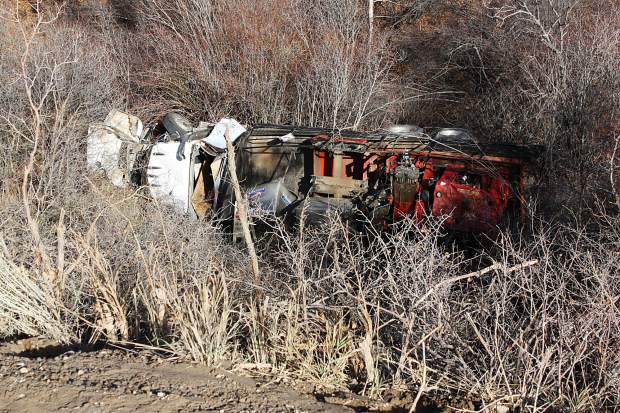If you need help after your work related injury in Colorado call me – Don Kaufman – 24/7 (970) 947-1776
OIL AND GAS TRUCK CRASHES INTO CREEK NEAR RIFLE

Ryan Hoffman
[email protected]
A large diesel truck ended up in the Beaver Creek south of Rifle Monday.
A large diesel truck that ended up in the Beaver Creek south of Rifle after working on oil and gas infrastructure Monday did not contaminate the city’s municipal water system, officials said.
In total, less than 10 gallons of oil and hydraulic fluid spilled from the truck, which was removed from the creek around 1 p.m. Wednesday, according to Chris Bornholdt, emergency manager with the Garfield County Sheriff’s Office.
The incident led the city to shut down its intake system for the Beaver Creek water treatment plant — one of two treatment plants that supply potable water to Rifle customers. The shutdown impacted 13 water users who pull raw water off the line that feeds the Beaver Creek plant.
The reaction is standard procedure anytime there is a potential impact within a watershed, said Robert Burns, operations manager for the city of Rifle utility department. Monitoring conducted at multiple locations did not reveal any contamination, he added.
The city’s intake system remained off Thursday as cleanup crews hired by the trucking company, Cameron International, a company specializing in pressure control technologies for the oil and gas industry, continued the cleanup process on soil and vegetation.
The vehicle, described in a Garfield County Sheriff’s Office press release as a large diesel truck with equipment mounted to a flatbed, was driving down Garfield County Road 317 around 5 p.m. Monday.
The vehicle was being used for conducting pressure testing associated with oil and gas infrastructure, according to a spill report from the Colorado Department of Public Health and Environment.
The area is populated with producing natural gas wells.
Another vehicle was approaching the truck when the driver attempted to move over toward the shoulder, Bornholdt said. The truck got too close to the edge of the road and went over.
Officials estimated the truck rolled approximately 1 ¼ times before coming to a rest. The driver sustained minor injuries.
Excessive speed, a frequent complaint raised during Garfield County Energy Advisory Board meetings, was not a factor in this incident.
“That was not the case,” Bornholdt said, adding the truck was going no more than 5 mph.
Tom VonDette, a rancher who serves as the resident representation for the Taughenbaugh Mesa area on the energy advisory board, said he was still unsure of many of the details Thursday.
Although he was one of the 13 users whose raw water access was cut off, the impact was minimal because VonDette has a nearby well that he could pull water from for his cattle. Some of the others did not have that luxury and were more irritated, he said, adding that the notification process could have been better.
Burns said Cameron, the company whose truck went into the creek, made arrangements to supply water to the impacted users.
Bornholdt, who credited Cameron and the cleanup company for taking the initiative in the matter, said the situation could have been worse. Oil and hydraulic fluid are relatively light fluids compared to diesel fuel, which would have sunk into the soils much quicker — complicating cleanup efforts.
He said he expected the cleanup operation to wrap up Friday afternoon.
*******************************************
General Public Information – *Not Legal Advice*
Do you have a question about workers compensation? Contact us today.
Póngase en contacto con el abogado Don Kaufman hoy para una consulta GRATUITA. (970) 947-1776 #Abogado #sehablaespañol
https://glenwoodattorney.com/legal-disclaimer/ https://glenwoodattorney.com/privacy-policy/
Donald J. Kaufman, Abogado
2520 Grand Avenue, Suite 110, Glenwood Springs, Colorado 81601-4195
@donald.j.kaufman.attorney
Publicidad de abogados destinada a su uso únicamente en Colorado. No se pretende ni se crea ninguna relación abogado-cliente. La Oficina Legal de Donald J. Kaufman es un abogado de Compensación Laboral de Colorado que representa únicamente a los trabajadores lesionados que han resultado lesionados en Colorado. Su enfoque es proteger los derechos de los trabajadores lesionados y sus familias. Con más de 27 años de experiencia, Kaufman y su firma han ayudado a miles de trabajadores lesionados de Colorado. El abogado Kaufman ayuda a los trabajadores lesionados en Glenwood Springs, Rifle, Silt, New Castle, Carbondale, Basalt, El Jebel, Aspen, Dotsero, Craig, Meeker, Rangely, Debeque, Minturn, Vail, Eagle, Gypsum, Leadville, Paonia, Frisco, Breckenridge. , Loveland, Denver, Grand Junction y Steamboat. Se habla español. Abogado de Colorado. Kaufman mantiene cámaras de seguridad de audio y video dentro y alrededor de su oficina para proteger a los clientes y las oficinas.
Attorney Advertising intended for use in Colorado only. No Attorney Client relationship intended or created. The Law Office of Donald J. Kaufman is a Colorado Workers’ Compensations Attorney representing only injured workers who have been injured in Colorado. His focus is protecting the rights of injured workers’ and their families. With over 27 years of experience, Kaufman and his firm has helped thousands of injured Colorado Workers. Attorney Kaufman helps injured workers in Glenwood Springs, Rifle, Silt, New Castle, Carbondale, Basalt, El Jebel, Aspen, Dotsero, Craig, Meeker, Rangely, Debeque, Minturn, Vail, Eagle, Gypsum, Leadville, Paonia, Frisco, Breckenridge, Loveland, Denver, Grand Junction and Steamboat. Se habla espanol. Abogado de Colorado. Kaufman maintains security audio/video cameras in and around his office to protect the cleints and offices. Attorney makes no express or implied guarantees concerning any outcomes. Donald J. Kaufman is responsible for the content on this website. This information is not to be interpreted as providing legal services, nor as proposing any form of legal advice. Anyone considering a lawyer should independently investigate the lawyer’s credentials and ability, and should not rely upon advertisements or self-proclaimed expertise. All content Copyright 1996-2023 © TM All rights reserved.







